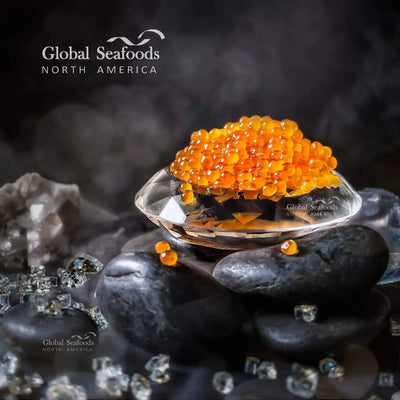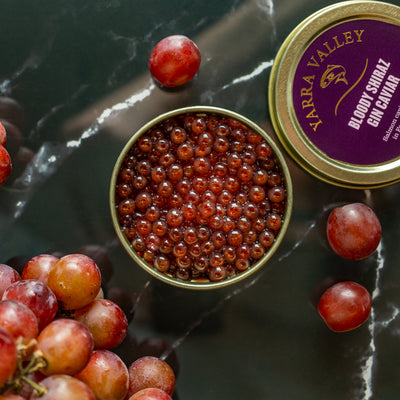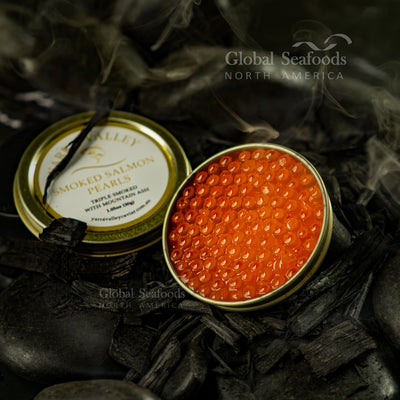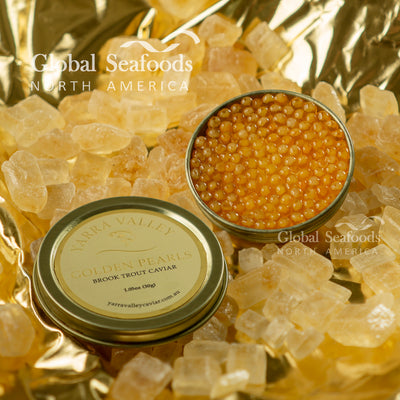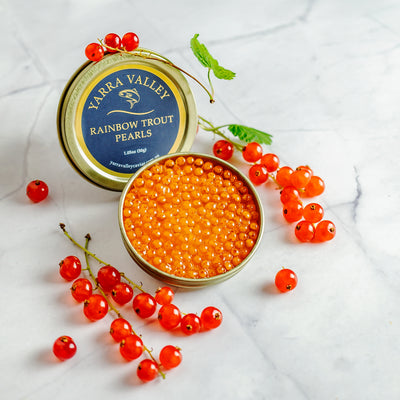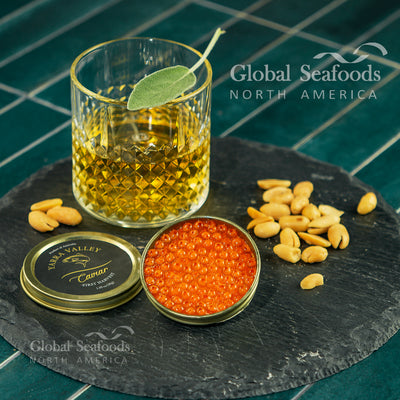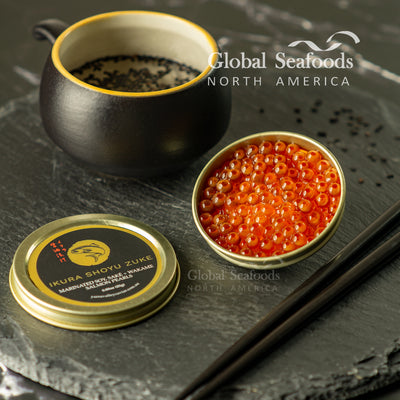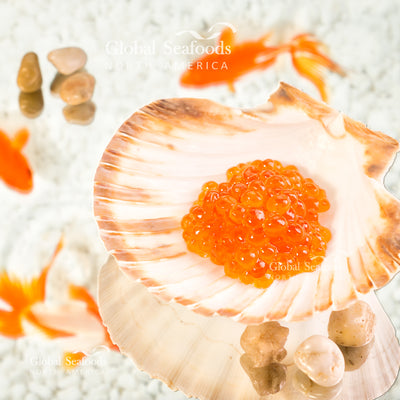The Ultimate Guide to Pairing Wine with Ikura

Pairing Wine with Ikura
Ikura, or salmon roe, is a delicacy celebrated for its rich, briny flavor and vibrant orange color. Known for its delicate texture and bold taste, ikura is a favorite in both Japanese and fusion cuisines. But pairing ikura with the right wine can elevate the entire dining experience, creating a harmonious blend of flavors that will delight your palate. Whether you’re serving ikura on its own, as part of sushi, or as a garnish for gourmet dishes, the right wine pairing can make all the difference.
In this comprehensive guide, we will explore how to pair wine with ikura, looking at the types of wines that best complement the unique characteristics of salmon roe. We’ll dive into expert tips, recommended pairings, and discuss why certain wines are the perfect match for this luxurious seafood treat.
Why Wine Pairing with Ikura Matters
Pairing ikura with the right wine enhances the tasting experience by balancing the natural brininess of the roe with the flavors of the wine. Because ikura has a rich, salty taste with a slightly creamy texture, it needs wines that can either cut through its richness or complement its flavors without overpowering it.
Renowned sommelier and wine expert Karen MacNeil, author of The Wine Bible, emphasizes the importance of balance when pairing wine with seafood: “The best wine and food pairings create a sum that’s greater than the parts. It’s all about balance—weight, acidity, and flavor.”
With ikura, this balance is achieved by choosing wines with crisp acidity, subtle fruit notes, and refreshing effervescence. Let’s explore the best wines to pair with ikura and why they work so well.
Best Wines to Pair with Ikura
1. Champagne and Sparkling Wines
Champagne and sparkling wines are often the go-to pairing for caviar and other types of roe, and ikura is no exception. The effervescence of sparkling wine helps cut through the richness of ikura, while its acidity complements the briny flavor of the salmon roe.
Why It Works:
- The bubbles cleanse the palate, making each bite of ikura feel fresh.
- The high acidity in Champagne balances the salty, oceanic taste of ikura.
- Subtle fruit notes in sparkling wines enhance the delicate sweetness of the roe.
For a truly luxurious experience, pair ikura with a vintage Champagne or a high-quality Crémant. If you're seeking variety, a Prosecco or Cava offers a more budget-friendly option while still delivering the crispness needed to balance the richness of the roe.
Pro Tip: Serve your ikura with sparkling wine as an appetizer or amuse-bouche, perhaps on a simple blini or toast with a dollop of crème fraîche for an elegant presentation.
2. Sauvignon Blanc
If you prefer still wines, Sauvignon Blanc is one of the top choices for pairing with ikura. This crisp, acidic wine has bright citrus and green apple notes that can cut through the rich, briny flavor of the roe, refreshing your palate with every sip.
Why It Works:
- The high acidity of Sauvignon Blanc balances the natural oils in ikura.
- Citrusy and herbal flavors contrast with the salty, creamy texture of the roe.
- Light body and mineral undertones don’t overpower ikura, allowing the roe’s flavors to shine.
For a perfect pairing, choose a Sauvignon Blanc from New Zealand or the Loire Valley, which tend to have higher acidity and more pronounced mineral characteristics.
3. Chablis (Unoaked Chardonnay)
If you're looking for a wine that brings more complexity without overwhelming the ikura, an unoaked Chardonnay—specifically Chablis from France—is an excellent choice. Chablis has a steely minerality and crisp acidity that pair wonderfully with seafood, making it an ideal match for ikura.
Why It Works:
- Chablis offers a clean, mineral-driven profile that complements the oceanic flavors of ikura.
- Its refreshing acidity cuts through the richness of the roe.
- The lack of oak allows the natural flavors of the ikura to remain the focal point.
Pair ikura with Chablis when serving it in more complex dishes, such as ikura risotto or sushi, where the wine’s minerality will enhance the flavor profile of the entire dish.
4. Sake (Junmai or Junmai Daiginjo)
While wine is a classic choice for pairing with seafood, sake—especially Junmai or Junmai Daiginjo varieties—offers a traditional and equally refined option for pairing with ikura. Sake’s umami-rich flavor and smooth texture make it a natural complement to the briny richness of ikura.
Why It Works:
- Sake’s umami notes echo the umami present in ikura, creating a harmonious match.
- The soft texture of Junmai Daiginjo sake balances the firm, popping texture of the salmon roe.
- A slightly chilled sake refreshes the palate without overpowering the delicate roe.
Sake pairing works beautifully with ikura served in traditional Japanese preparations, such as ikura gunkan maki (battleship sushi) or atop rice in an ikura donburi.
5. Rosé Wines
For those looking for a wine that offers the best of both worlds—brightness and depth—rosé wines can be an excellent pairing for ikura. A dry rosé, especially from Provence, provides enough acidity to balance the roe while offering subtle fruit notes that complement the brininess.
Why It Works:
- Dry rosé has the right level of acidity to refresh the palate.
- The fruit-forward notes enhance the subtle sweetness in the ikura.
- The light body ensures that the ikura remains the star of the dish.
Serve ikura alongside a dry rosé during a summer meal or as part of a seafood platter featuring a variety of roe, such as Rainbow Trout Pearls or Golden Pearls Brook Trout Caviar from Global Seafoods.
How to Serve Ikura for Wine Pairing
When preparing ikura for wine pairing, presentation and complementary flavors are key. Here are a few ideas to enhance the experience:
- Ikura Canapés: Serve ikura on lightly buttered toast points or blinis with a dollop of crème fraîche. The creaminess of the topping will balance the brininess of the roe and complement the wine’s acidity.
- Ikura Sushi: Pair your favorite sushi rolls, especially gunkan maki, with a crisp wine like Sauvignon Blanc or Chablis.
- Ikura Risotto: A creamy risotto topped with ikura pairs beautifully with a light, unoaked Chardonnay or sparkling wine. Try this recipe for Ikura Risotto for inspiration.
- Seafood Platters: Create a seafood platter featuring ikura, oysters, and other shellfish. Sparkling wine or rosé will tie all the flavors together harmoniously.
For the freshest ikura and other premium roe options, visit Global Seafoods' Red Caviar Collection, where you can explore a variety of top-quality salmon roe, including Pink Salmon Caviar and Chum Salmon Caviar.
Frequently Asked Questions About Pairing Wine with Ikura
1. Can I pair red wine with ikura?
Red wine generally doesn’t pair well with ikura due to its tannins, which can clash with the briny, oily texture of the roe. However, if you prefer red, a light-bodied, low-tannin red like Pinot Noir may work in specific dishes where the ikura is served with richer ingredients.
2. What’s the best serving temperature for ikura and wine pairings?
Ikura should be served chilled, but not frozen, to maintain its delicate texture. For wine, serve sparkling wines and sauvignon blancs between 45-50°F, chablis at 50°F, and sake slightly chilled at around 50-55°F.
3. How should ikura be stored before serving?
Ikura should be stored in an airtight container in the refrigerator and consumed within 3-4 days for optimal freshness. If necessary, ikura can be frozen for longer storage, but be sure to thaw it in the fridge before serving.
4. Where can I buy high-quality ikura online?
For premium-quality ikura, visit Global Seafoods. They offer sustainably sourced options like Coho Salmon Caviar and Trout Red Caviar.
5. Is it necessary to serve ikura with bread or crackers?
While ikura can be enjoyed on its own, serving it with bread, crackers, or blinis provides a nice contrast in texture and can help balance the intensity of the flavors.
Conclusion: Elevate Your Ikura Experience with the Perfect Wine Pairing
Pairing ikura with the right wine enhances its rich, briny flavors while adding layers of complexity to the overall tasting experience. Whether you choose a crisp Sauvignon Blanc, a bubbly Champagne, or a refined sake, the right pairing will make your ikura meal truly unforgettable.
For the finest ikura and other premium roe options, be sure to visit Global Seafoods. And for more tips on enjoying seafood, check out their YouTube Channel for recipes and expert insights.
Also in News

How to Make Sea Bream Sushi With Dry-Aged Tuna & Crab Roll — Step-by-Step With Chef Joshua
A complete guide to making Sea Bream sushi at home, including filleting, curing, slicing, and building a Dry-Aged Tuna & Crab sushi roll. Chef Joshua shares professional tips for restaurant-quality results.

Cooked Crab for Game Night: Everything You Need for a Perfect Seafood Party
Take your game night to the next level with a Cooked crab party. Learn the best recipes, cooking tips, and hosting hacks for a memorable seafood feast.

Steam Crab for Date Night: A Romantic Guide to the Perfect Seafood Feast
Make your next date night unforgettable with a romantic Steam crab experience. This guide covers everything you need to know, from ambiance to the best crab varieties.

